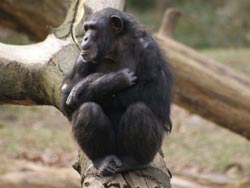Chimpanzees of a feather sit together: Friendships are based on homophily in personality

Chimpanzee Tushi <br>(Copyright: Jorg Massen)
Cognitive Biologists of the University of Vienna, Austria, and the University of Zurich, Switzerland, explored that chimpanzees choose their friends as to be similar in personality. The results of this study appear in the scientific journal “Evolution and Human Behaviour”.
Jorg Massen (University of Vienna) and Sonja Koski (University of Zurich) together measured chimpanzee personality in two zoos with behavioural experiments and years of observations of chimpanzee behaviour. They also carefully logged which chimpanzee sat in body contact with whom most. “This is a clear sign of friendship among chimpanzees”, explains Jorg Massen. Subsequently, the researchers tested, if those chimpanzees who sit together frequently have similar or different personality types.
“We found that, especially among unrelated friends, the most sociable and bold individuals preferred the company of other highly sociable and bold individuals, whereas shy and less sociable ones spent time with other similarly aloof and shy chimpanzees”, says the researcher. The researchers argue that such a strong preference for self-like individuals is probably adaptive, because frequent cooperation becomes more reliable when both partners have similar behavioural tendencies and emotional states.
This finding strongly resembles the known “similarity effect” in humans: We tend to make friends with people who are equally extraverted, friendly and bold as ourselves. “It appears that what draws and keeps both chimpanzee and human friends together is similarity in gregariousness and boldness, suggesting that preference for self-like friends dates back to our last common ancestor”, ends Jorg Massen.
Publication in “Evolution and Human Behaviour”
Massen, J.JM., & Koski, S.E.: Chimps of a feather sit together: chimpanzee friendships are based on homophily in personality, in: Evolution and Human Behavior (2013), published online Oktober 2, 2013,
http://dx.doi.org/10.1016/j.evolhumbehav.2013.08.008
Scientific contact
Jorg J.M. Massen, PhD
Department of Cognitive Biology
University of Vienna
1090 Vienna, Althanstraße 14
T +43-699-1131 0182
jorg.massen@univie.ac.at
Further inquiries
Mag. Alexandra Frey
Press office, University of Vienna
Research and Teaching
Universitätsring 1, 1010 Vienna
T +43-1-4277-175 33
M +43-664-602 77-175 33
alexandra.frey@univie.ac.at
Media Contact
More Information:
http://www.univie.ac.atAll latest news from the category: Life Sciences and Chemistry
Articles and reports from the Life Sciences and chemistry area deal with applied and basic research into modern biology, chemistry and human medicine.
Valuable information can be found on a range of life sciences fields including bacteriology, biochemistry, bionics, bioinformatics, biophysics, biotechnology, genetics, geobotany, human biology, marine biology, microbiology, molecular biology, cellular biology, zoology, bioinorganic chemistry, microchemistry and environmental chemistry.
Newest articles

Machine learning algorithm reveals long-theorized glass phase in crystal
Scientists have found evidence of an elusive, glassy phase of matter that emerges when a crystal’s perfect internal pattern is disrupted. X-ray technology and machine learning converge to shed light…

Mapping plant functional diversity from space
HKU ecologists revolutionize ecosystem monitoring with novel field-satellite integration. An international team of researchers, led by Professor Jin WU from the School of Biological Sciences at The University of Hong…

Inverters with constant full load capability
…enable an increase in the performance of electric drives. Overheating components significantly limit the performance of drivetrains in electric vehicles. Inverters in particular are subject to a high thermal load,…





















